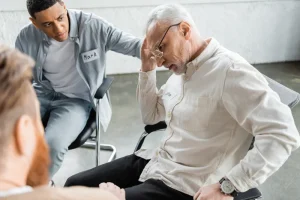These Dos and Donts Can Help You Share Your Recovery Story

It creates self-reflection opportunities and offers support. When sharing a recovery story, it’s important to be emotionally stable and get help if needed. It should balance the challenges of addiction and the triumphs of recovery. Everyone has a unique relationship with addiction and recovery.
Addiction Treatment Programs

Addiction recovery is a deeply personal journey full of ups and downs. Someone in recovery may recall specific moments when they felt pride, regret, challenged, and a whirlwind of other emotions. They might remember days they felt alone and times they felt supported. Still, it’s vital that those who want to share get an opportunity to do so.
Ricky Martin shaves it all off for his latest TV role: “Are you ready?”
- Members of Alcoholics Anonymous can find comfort and help by sharing their stories.
- That way, they stay committed to sobriety and don’t feel so alone.
- Others need to see that you are not perfect and that you have made mistakes.
- These stories help people express emotions, experiences and lessons learnt.
- By sharing personal experiences, individuals can find healing and support, and also inspire others to seek help and believe in the possibility of recovery.
There is, however, power in opening up and sharing your recovery. Telling your story can help your own recovery journey, heal the hurt your loved ones have experienced, and offer encouragement and support to others battling addiction. Online platforms for sharing recovery stories are built on hope, education, and connection. They offer individuals in addiction recovery a source of hope by showcasing stories of successful triumphs.
Do: Let Your Emotions Show

They will be reminded that they are not alone sharing your story in recovery and can make it through recovery to find a happy life in sobriety. You can become a mentor for that person, sharing advice, coping techniques, and more with the individual so they can get through recovery too. Connecting with others who have shared similar experiences is paramount in addiction recovery. Establishing a network of sober friendships offers a sense of belonging and support, which can have a profound impact on one’s journey. Group therapy and 12-step programs provide a platform for individuals to share their stories and find strength in unity.
- It takes a lot of strength and resilience to get on the path to recovery and stay there.
- Perhaps most important of all, sharing your story will help your recovery.
- But the psychological effects can last for a very long time.
- Low moments in the throes of addiction aren’t moral failings, but you do have to accept responsibility for your actions.
Out of all three major components of your story, this one should come the most naturally. This is the moment at which your life changed for the better, the moment at which you experienced mindfulness in a manner such as never before. It’s impossible to tell your story without including this moment of clarity. It’s important to know that sharing involves both talking AND listening. There are also many benefits that come with listening and being receptive to the stories of others in recovery.
- Telling your story can also be frightening if you have trouble opening up to others.
- Prior to his current role as Chief Community Recovery Officer, Randal served eight years as Assistant Commissioner with the Tennessee Department of Children’s Services.
- By sharing the challenges you faced, the obstacles you overcame, and the tools you acquired during your recovery, you offer a roadmap for others seeking their own path to healing.
- Even then, you may choose to talk about these things when telling your story.
- For me, this photo conveys the weariness we feel during difficult moments in life.
- This honest insight into your story can be constructive for someone just starting on their journey.
Help make sure LGBTQ+ stories are being told…

For the audience, listening to personal stories offers education, inspiration, and motivation. It lets them know they are not alone in their struggles and provides a sense of hope for their own recovery. They make a connection on an emotional level and can give hope, education and a feeling of belonging.




